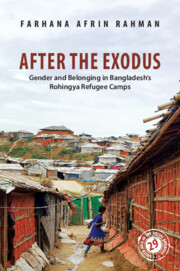Book contents
- Frontmatter
- Dedication
- Contents
- Acknowledgements
- Prologue
- 1 Introduction
- 2 Stories and Silences: On Entering and Writing Women’s Worlds
- 3 Life Under Siege: On Violence and Displacement
- 4 At Journey’s End: On Home and Belonging
- 5 Beyond Brides: On Marriage and Moral Panics
- 6 Broken Breadwinners: On Womanhood and Gender Divisions of Labour
- 7 The Price of Development: On NGOs and Gender Programming
- 8 Conclusion
- Epilogue
- Glossary
- Bibliography
- Index
8 - Conclusion
Published online by Cambridge University Press: 13 November 2024
- Frontmatter
- Dedication
- Contents
- Acknowledgements
- Prologue
- 1 Introduction
- 2 Stories and Silences: On Entering and Writing Women’s Worlds
- 3 Life Under Siege: On Violence and Displacement
- 4 At Journey’s End: On Home and Belonging
- 5 Beyond Brides: On Marriage and Moral Panics
- 6 Broken Breadwinners: On Womanhood and Gender Divisions of Labour
- 7 The Price of Development: On NGOs and Gender Programming
- 8 Conclusion
- Epilogue
- Glossary
- Bibliography
- Index
Summary
Through the narratives of everyday experiences, I have sought to examine the transformation of gender identity, relations, and roles of Rohingya women in the refugee camps in Bangladesh – of how they see themselves and how they make a life despite their difficult circumstances. Focusing on the voices of Rohingya women helps to highlight the impacts of forced migration on how the ‘gendered self is transformed’ and the ways in which these women learn to negotiate and navigate new environments, thereby reshaping ‘strategies of selfhood’ (Bhabha 1994; Abusharaf 2009; Fiddian-Qasmiyeh 2014). While the prevailing scholarly literature on refugees details many of the complexities of displacement, much of the attention is put on the challenges and suffering faced by refugees during and after forced migration. One strand of research that remains underrepresented is a grounded understanding of refugee experiences more broadly – and that of refugee women specifically – that focuses on their ability to reconstruct their lives after displacement. This book is an attempt to look beyond these broad assumptions by providing a lens into the everyday, the mundane, the quotidian parts of Rohingya women's lives in the Kutupalong–Balukhali mega-camp, after experiencing violence and forced migration. Through the narratives, stories, and emotions conveyed in the preceding chapters, I have sought to uncover how the experiences of Rohingya women during and after forced migration, as well as their strategic deployment of varying forms and degrees of economic, social, and cultural capital, help them to recreate a sense of community and ‘life’ in the camps. This book thus showcases the creative capacity of refugee women to apply their own frames of meaning within the camps – frames that are distinct from the commonly promoted or taken-for-granted assumptions of NGOs and humanitarian aid agencies.
Through feminist ethnographic research, this book has shown that the camps have neither destroyed pre-existing conceptions of masculinity and femininity, nor have they left them unchanged – instead, these notions have come to occupy an ‘in-between’ space, opening up the possibilities of empowerment while also reifying gendered expectations. Gendered positions do not remain static – rather, Rohingya women negotiate and navigate patriarchal structures and power asymmetries, highlighting their agentic capacity.
- Type
- Chapter
- Information
- After the ExodusGender and Belonging in Bangladesh's Rohingya Refugee Camps, pp. 130 - 133Publisher: Cambridge University PressPrint publication year: 2025

